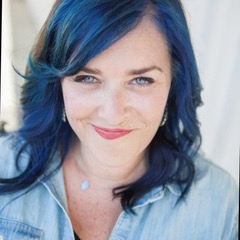JESSICA BLUE

Jessica Blue has been a voice actress for 20 years and is an English dubbing voice and casting director on projects for Netflix, Disney+, HBO, Hulu, Amazon, and more. As a VO talent, some of Blue’s clients include Google, Microsoft, Macy’s, Wells Fargo, Whole Foods, TD Ameritrade, and John Deere. She’s also provided voices for several dubbed films and series. Some of the dubbing projects she’s directed include Crooks (Netflix), Moving (Hulu), Burning Betrayal (Netflix), Bad Signal: The Series (Hulu), Rich in Love 1 & 2 (Netflix), and Followers (Netflix). She’s also a world traveler, author and indie film producer.
FEEDBACK
GENERAL NOTE FOR EVERYONE:
THANK YOU ALL so much for your submissions!! I so appreciate your willingness to go for it, participate and be open to feedback!!
Dubbing auditions can be really tough, as you have very little to go on (unless you have the luxury of watching a video clip, which isn’t always the case), but you all did quite well. That said, you must rely on the specs and the script and any other piece of information that you’re given, so you can give your best performance. The specs and dialogue (of your character AND those you’re talking to) have CLUES which you need to pay attention to, identify and use to your advantage, as that is what will make your audition stand out. You’ll read in some of my comments examples of clues to look for, either in the dialogue or the specs. Some are obvious, others not as much. Think theatrically – where are they, what’s going on around them, as well as why are they saying what they’re saying, and who are they talking to?
Script analysis is incredibly important in dubbing auditions because you have to figure what’s going on in the film/show without having the picture to rely on. It’s much easier to interpret what’s happening when you can watch the video in the session, but we gotta get you there first! So, pay close attention to the turns in the scene. A turn is a shift in the dialogue, a change of subject, or an attitude change because of information the character just got. That may very well change your projection level (softer/louder), your attitude, and/or your intention. Often times, the sides that are given for dubbing auditions are carefully chosen scenes, sometimes with different emotions/attitudes within the same scene. This is done intentionally! Casting directors are listening to see if you picked up on the turn and shifted accordingly, and to hear how well you interpreted it, if at all.
Lastly, please do yourself a favor: if your audition sides contain two or more scenes back to back, PLEASE give a good solid beat between each scene on your mp3. They are likely NOT consecutive scenes in the original production and the characters are usually in a completely different location in each scene, thereby warranting different attitudes/projection. I want to hear that it’s a new moment, not a continuation (unless it says that it is). Again, read the breakdown, read the specs, read everything! Then read it all again! 🙂
Thanks again and I’ll see some of you on Zoom next week!
LISTENING
You are welcome to listen to your own recording as well as everyone else’s recordings. They are all available to download to members of the VOWW. Hearing your peers do what THEY do is always a great opportunity to learn.
A piece of copy in any genre can be read 1,000’s of ways. In the real world you are auditioning against 100’s of other actors never knowing really what you are up against. The VOWW is an incredible behind the scenes look into what other actors are doing with the same piece of copy. How other home studio’s sound compared to yours. What feedback would look like depending on how any performance is delivered. It can be eye opening, well EAR opening in many ways for the participants who take the time to delve into all the reads and feedback and not just their own.
